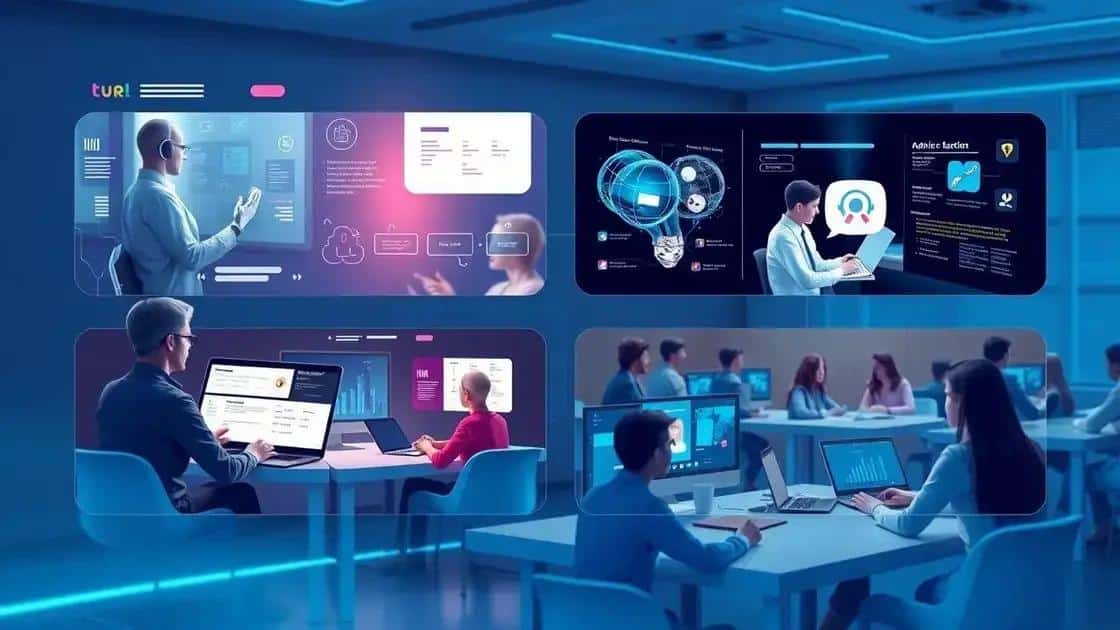Insights on online course trends that you should know

Insights on online course trends include the rise of micro-credentials, the integration of AI for personalized learning, and the importance of community in enhancing the educational experience.
Insights on online course trends show us how the landscape of learning is evolving rapidly. Have you noticed how more people are turning to digital platforms for education? Let’s dive into what’s shaping the future.
Emerging trends in online courses
Emerging trends in online courses are transforming how we learn and engage with education. As technology evolves, so do the methods and platforms that deliver online learning experiences. It’s important to stay updated with these changes to maximize effectiveness.
Personalized Learning Experiences
One of the most notable trends is the move toward personalized learning. Courses are increasingly tailored to meet individual needs, allowing learners to progress at their own pace. This customization helps maintain engagement and results in better educational outcomes. Additionally, instructors can now utilize data analytics to monitor student progress and adapt their teaching accordingly.
Increased Use of Video Content
An engaging approach to online education is leveraging video resources. This format caters to various learning styles and keeps learners interested. Videos can include tutorials, lectures, and discussions, providing a rich multimedia experience.
Benefits of Video Content:
- Improved retention of information
- Accessibility for all learners
- Opportunity for visual and auditory learning
As we see more instructors adopting this format, it’s clear that video content plays a crucial role in enhancing the online learning environment.
The Rise of Community and Collaboration
Another significant trend is the focus on building a sense of community in online courses. Collaborative features like discussion boards and group projects allow learners to interact and learn from each other. This interaction fosters a more enriching experience and helps combat feelings of isolation that can sometimes accompany online learning.
The integration of social learning features provides opportunities for peer feedback and support, making the learning journey more connected and less solitary. As virtual interactions become the norm, emphasis is placed on creating an inclusive and supportive online environment.
Finally, as online course trends continue to emerge, it is essential for learners and educators alike to embrace these changes. Being aware of these trends not only enhances the educational experience but also prepares individuals for future learning journeys.
The rise of micro-credentials

The rise of micro-credentials signifies a change in how education is perceived and delivered. These short, focused qualifications offer learners a way to enhance their skills without pursuing a full degree. This flexibility suits modern lifestyles and the fast-paced job market.
What Are Micro-Credentials?
Micro-credentials are specific achievements that represent skills acquired through short courses or training programs. They can be earned in various fields, from technology to arts. The emphasis is on practical skills that are relevant to employers, which makes them attractive to many learners.
Benefits of Micro-Credentials:
- Flexibility in learning
- Focus on specific skills
- Quick certification process
- Increased employability
Micro-credentials allow students to tailor their education to match career goals. This way, individuals can quickly adapt to skill demands in their industries.
The Role of Employers
Employers increasingly recognize these credentials as valuable proof of a candidate’s skills. They reflect a commitment to continuous learning, which is essential in today’s workforce. Companies appreciate the specific expertise that micro-credentials provide.
As businesses evolve, they seek employees who can quickly adapt to new technologies and methodologies. Micro-credentials demonstrate an individual’s willingness to stay current and relevant in their field. This proactive approach to learning is now more important than ever.
The popularity of micro-credentials continues to grow as individuals value competency-based learning. These qualifications are often more affordable and accessible than traditional degrees, making them an ideal choice for many learners. Adopting them can open up new doors in both personal and professional growth.
Importance of community in learning
The importance of community in learning cannot be overstated. A strong community enhances the educational experience and fosters a sense of belonging among learners. When students feel they are part of a community, they are more likely to engage and succeed.
Benefits of Learning Communities
Learning communities provide support and encourage collaboration. They create an environment where individuals can share ideas and resources. This interaction can lead to deeper understanding and retention of knowledge. Being part of a community helps students overcome challenges more effectively.
Key Benefits:
- Enhanced motivation
- Increased accountability
- Access to diverse perspectives
- Shared resources and strategies
Through collaboration, learners can gain insights that may not come from isolated study. The social aspect of learning also leads to lasting friendships and networks, which can be beneficial for future opportunities.
Online Learning Communities
In the realm of online education, community building is especially vital. With the physical distance, establishing connections can be challenging but essential. Technologies such as discussion forums, group projects, and virtual meetups help bridge that gap.
Many platforms now include features designed to foster community, making it easier for learners to interact. Participating in forums or group discussions allows individuals to express their thoughts while gaining feedback from peers. This openness promotes an inclusive atmosphere that benefits all members.
Ultimately, the importance of community in learning highlights that education is not just about acquiring knowledge; it’s also about building relationships. Engaged communities can make learning more effective and enjoyable, leading to better outcomes for everyone involved.
Future predictions for online education

Future predictions for online education highlight significant changes in how learning will occur over the next few years. The landscape of education is evolving rapidly, influenced by advances in technology and the needs of learners. It is crucial to understand these trends to prepare for what lies ahead.
The Integration of Artificial Intelligence
Artificial intelligence (AI) is set to transform online education significantly. AI can personalize learning experiences by adapting content to match individual student needs. This approach helps maintain engagement and improves outcomes by offering tailored resources.
Key Predictions:
- Enhanced interactivity through AI tutors
- Adaptive learning platforms that adjust to user performance
- Automated assessments and feedback systems
- Personalized study plans and recommendations
As AI becomes more integrated, educators will also have the opportunity to focus more on facilitating and mentoring students instead of just delivering content. This shift allows for deeper connections and more effective teaching methods.
The Rise of Hybrid Learning Models
Another key trend is the rise of hybrid learning models. These approaches combine online and in-person components to create a flexible learning environment. As many institutions adapt to the post-pandemic world, these models will likely become the norm.
Hybrid models facilitate a balance between the convenience of online coursework and the social interaction of in-person classes. This flexibility can cater to diverse learning preferences and improve overall student satisfaction. As technology advances, hybrid environments will become even more engaging and effective.
The future of online education will also see an emphasis on global learning opportunities. With the world becoming more connected, students can access resources and courses from institutions around the globe. This trend not only broadens horizons but also fosters cultural understanding and diversity in learning.
In summary, the future predictions for online education indicate an exciting time for learners and educators alike. By embracing technology and innovative approaches, education can continue to evolve, making learning more accessible and effective for everyone.
In conclusion, the future of online education promises exciting changes that can enrich the learning experience for students and educators alike. With the integration of artificial intelligence, hybrid learning models, and a focus on community, education is becoming more personalized and accessible. As we embrace these trends, it’s clear that innovation will create opportunities for meaningful connections and knowledge sharing. By staying informed about these developments, learners can prepare for a dynamic educational environment that meets their needs and ambitions.
FAQ – Frequently Asked Questions about Online Education Trends
What are micro-credentials and why are they important?
Micro-credentials are short qualifications that demonstrate specific skills. They are important because they offer flexibility and focus on what employers value.
How does community impact online learning?
A strong community enhances support, motivation, and collaboration, making the learning experience richer and more engaging.
What is the role of AI in online education?
AI personalizes learning experiences, adapts content to individual needs, and automates assessments, significantly improving educational outcomes.
What does the future of online education look like?
The future includes hybrid learning models, global access to resources, and continuous innovation, making education more accessible and effective.






